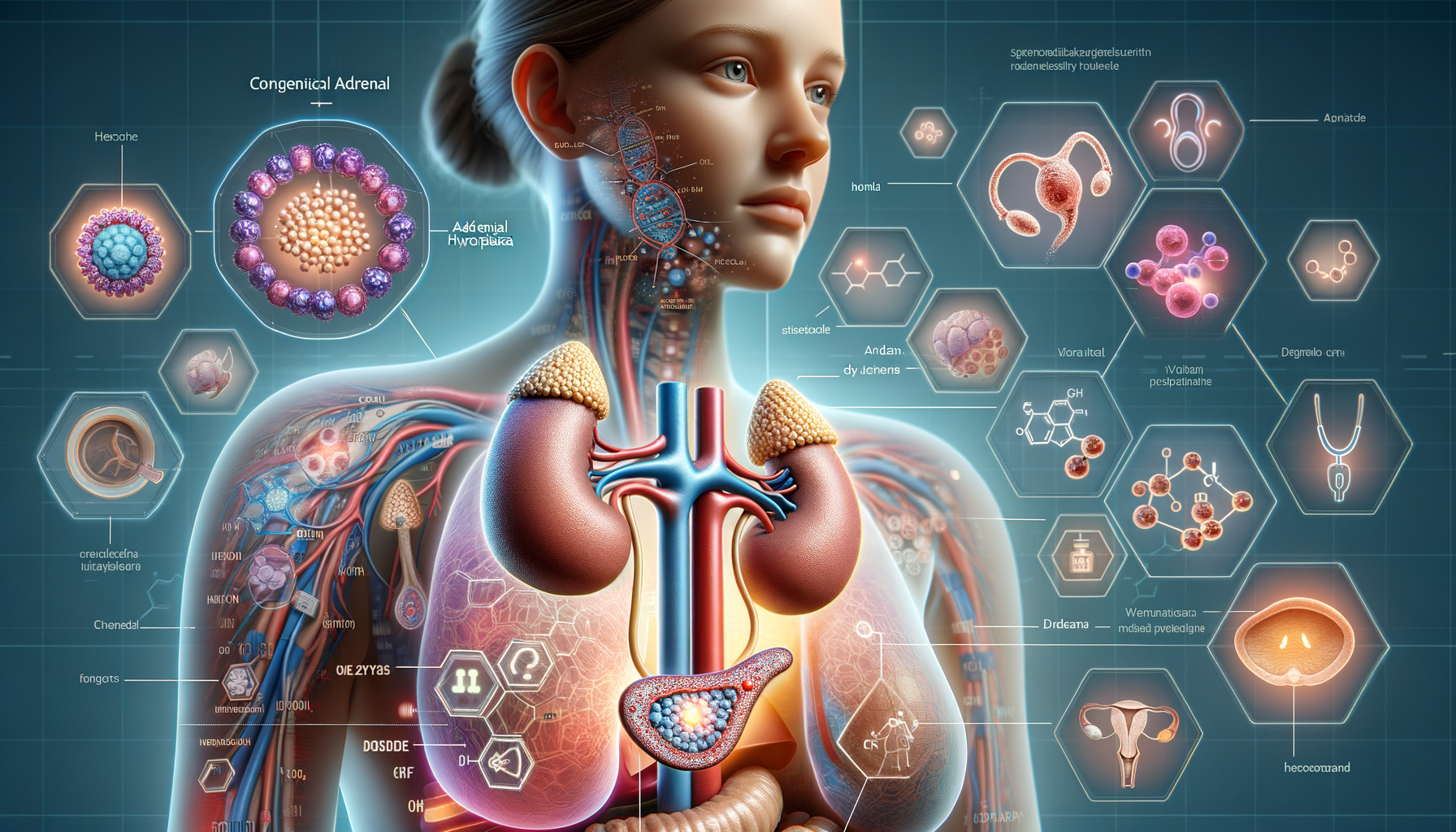Introduction to Congenital Adrenal Hyperplasia
Congenital Adrenal Hyperplasia (CAH) is a group of genetic disorders affecting the adrenal glands, which are responsible for producing vital hormones like cortisol, aldosterone, and androgens. This condition can have significant implications for health, especially in women. Understanding CAH is crucial for managing its symptoms and ensuring a balanced lifestyle. Women with CAH may experience a range of symptoms, including irregular menstrual cycles, excessive hair growth, and fertility challenges. Early diagnosis and treatment are essential for managing these symptoms effectively.
CAH is typically inherited in an autosomal recessive pattern, meaning both parents must carry a copy of the mutated gene. While CAH can affect both genders, women often face unique challenges due to hormonal imbalances. This article aims to provide an in-depth understanding of CAH, its implications for women’s health, and strategies for effective management.
Symptoms and Diagnosis of CAH
Recognizing the symptoms of CAH is the first step toward effective management. Common symptoms in women include:
- Irregular menstrual cycles
- Excessive hair growth (hirsutism)
- Acne
- Fertility issues
- Ambiguous genitalia at birth in severe cases
Diagnosis typically involves a combination of clinical evaluation, hormone tests, and genetic testing. Hormone tests measure levels of cortisol, aldosterone, and androgens, which are often imbalanced in individuals with CAH. Genetic testing can confirm the presence of mutations in the CYP21A2 gene, the most common cause of CAH.
Early diagnosis is crucial for managing CAH effectively. It allows for timely intervention and reduces the risk of complications. Healthcare providers play a vital role in diagnosing CAH and guiding patients through the management process. Regular check-ups and monitoring are essential to ensure that hormone levels remain balanced and symptoms are controlled.
Treatment and Management Strategies
Managing CAH involves a multidisciplinary approach, focusing on hormone replacement therapy and lifestyle modifications. The primary treatment for CAH is glucocorticoid replacement therapy, which helps regulate hormone levels and alleviate symptoms. In some cases, mineralocorticoid replacement may also be necessary to manage aldosterone deficiencies.
In addition to medication, lifestyle changes can significantly impact the management of CAH. Women with CAH should work closely with healthcare providers to develop a personalized management plan. This plan may include:
- Regular medical check-ups to monitor hormone levels
- Dietary modifications to support overall health
- Exercise regimens to maintain a healthy weight and reduce stress
- Stress management techniques, such as yoga or meditation
Collaborating with a team of healthcare professionals, including endocrinologists, gynecologists, and nutritionists, can provide comprehensive support for women with CAH. This team approach ensures that all aspects of health are addressed, promoting better outcomes and quality of life.
Living with CAH: Personal Stories and Experiences
Living with CAH can be challenging, but many women lead fulfilling lives by staying informed and proactive about their health. Personal stories and experiences offer valuable insights into the daily realities of managing CAH. These narratives highlight the importance of community support, resilience, and empowerment.
For instance, some women with CAH share their experiences of overcoming fertility challenges and starting families with the help of medical interventions. Others emphasize the importance of mental health support in coping with the emotional aspects of living with a chronic condition. These stories underscore the diverse experiences of women with CAH and the various paths to managing the condition.
Engaging with support groups and online communities can provide a sense of belonging and encouragement. Sharing experiences with others who understand the challenges of CAH fosters a supportive network, offering practical advice and emotional support. This community connection can be a powerful tool in navigating the complexities of CAH.
Future Directions and Research in CAH
Research in CAH continues to evolve, offering hope for improved treatments and outcomes. Advances in genetic research and hormone therapies hold promise for more effective management strategies. Current research focuses on understanding the genetic basis of CAH, developing novel therapies, and improving diagnostic techniques.
Emerging treatments, such as gene therapy and precision medicine, aim to address the root causes of CAH and offer more personalized approaches to management. These innovations have the potential to transform the landscape of CAH treatment, providing new avenues for symptom control and quality of life improvement.
Staying informed about the latest research developments is crucial for individuals with CAH and their healthcare providers. By keeping abreast of new findings and treatment options, women with CAH can make informed decisions about their care and explore emerging therapies that may enhance their well-being. The future of CAH management is promising, with ongoing research paving the way for more effective and tailored approaches to care.




Leave a Reply